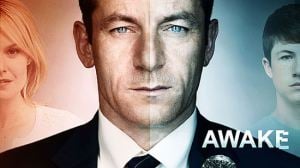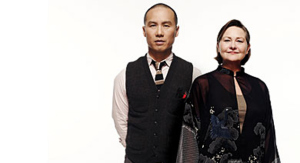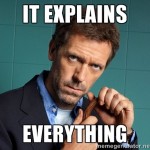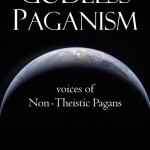I’ve been watching this series on TV, “Awake”, and I noticed a parallel to some of my interactions with atheists and with believers. The show is about a police detective (Britten) who is in a wreck with his wife and son. Either his wife or his son die, depending on what reality he is in. After the wreck, when he goes to sleep in one reality where his wife died and son lived, he immediately wakes up in another reality, where the son died and his wife is alive. And when he goes to sleep again, he is back in the other reality.
Neither reality seems like a dream to him. The two realities are filmed with an orange or green tint to designate which reality he is in. He wears orange and green wristbands in each reality so he can keep the two straight. Then it gets really weird, because little things are different in each reality. And things that happen in one reality give him clues to things going on in the other reality. It may be a clue to help him solve a case, or a clue about how to connect better with his son.

What’s been really interesting to watch, though, has been the two therapists he has in each reality. Both therapists assure him that he is awake in “their” reality and not dreaming. But both approach the “other reality” very differently. There’s an article on the two therapists here.

In the “orange reality” where Britten’s wife is alive, the therapist is Dr. Lee. Dr. Lee is intent on proving to Britten that the other reality is a dream, i.e., a fantasy. Many of his comments to Britten are along the lines of: “Isn’t the more reasonable explanation that …” He tells Britten:
“You condition is the result of a deeply fractured psyche. It is a problem. It is not a tool.”
He tells Britten that it is a problem that he is allowing his “dreams” to direct his real life because “the subconscious can be a highly unreliable witness.” According to Dr. Lee:
“This fantasy is far from benign. While your brain should be resting, recharging, your subconscious is using it to uphold a detailed and complicated alternate reality. If we don’t deal with that, the situation will eventually become unsustainable.”
In contrast, in the “green reality”, Britten’s therapist, Dr. Evans, takes a very different approach. She sees the dreams, not as a problem, but as a tool. In contrast to Dr. Lee, Dr. Evans is not concerned with what’s “real” and what’s not. When Britten encounters the same young woman (Kate) in both realities who are in very different life situations, Dr. Evans tells Britten:
“I think what’s more relevant than the question of which Kate is real, is why you are seeing her in the one world and reflecting her so differently in the other.”
In other words, rather than trying to prove to Britten that the dream is false and her reality is real, Dr. Evans tries to get to the meaning of the dream. Mind you, she never treats the dream reality as “real” per se, but she does treat it as meaningful. In fact, she treats Britten’s “dreams” as a boon. After telling her about how clues in the one reality helped him in the other, she tells him:
“My God, that is interesting. Do you know that the exact access to the unconscious mind that you are describing has been sought after since the beginning of civilization. The Greeks used to sleep in temple chambers hoping to receive insight from their dreams. Even philosophers and scientists have recorded incredible breakthroughs delivered to them while asleep.
“I think these kinds of connections between your worlds can be incredibly beneficial. I support a more active connection between your conscious and unconscious mind. I think it’s going to aid you in uncovering and processing the source of your emotional issues.”
My wife is a marriage and family therapist, and I asked her about this. I think she leans more in the direction of Dr. Lee’s approach. She tries to give people what Dr. Phil calls “wake up calls”, to show them that that they are doing is not really working for them. I’ll call this “reality-focused” approach. But I wonder, when someone is caught in a “fantasy”, is it effective to just tell them that what they experience as reality is not in fact reality (in the therapist’s opinion)? I would prefer Dr. Evans’ approach, which works from within the fantasy and tries to find its meaning. I’ll call this a “meaning-centered” approach. My wife would respond, I suspect, that insight into the meaning of one’s “reality” is all well and good, but it takes us nowhere unless there is a corresponding change in “reality”, in behavior.
As I watched this, it occurred to me that my interaction with atheists and believers often mirrors the conversations that Detective Britten has with Dr. Lee and Dr. Evans respectively. When I speak to people who self-identify as atheist, or to Naturalistic Pagans who emphasize heavily the naturalistic side of the Naturalistic-Paganism equation, I feel very much like I am talking to Dr. Lee. The conversation centers around the question of “what is real?” And, for them, what is not “real” is fantasy and is, as Dr. Lee says, “far from benign”.
On the other hand, when I speak to people who do not self-identify as atheists (I’ll call them “believers”), or to Naturalistic Pagans who give more emphasis to the pagan side of the Naturalistic-Paganism equation, then I feel like I am having a conversation with Dr. Evans. And I have to admit that I feel much more at home in that conversation, where the concern is not “what is real”, but “what does that mean?” I don’t think the shows writers want to make either therapist’s approach more appealing. But I am strongly drawn to Dr. Evans’ approach.
I feel like the reality-focused approach is caught up trying to prove whose version of reality is “real” and misses what I consider the point … the meaning of our experience. What is point of striving to strip all “fantasy” from our lives, if in the process we also strip all meaning from it? Now, before those reality-focused types reading this get riled up, I am not equating fantasy with meaning, and I am not saying that a reality-focused experience is not meaningful. What I am saying s that, when I am having a conversation with a reality-focused type person, I just find myself wondering what the point is.















